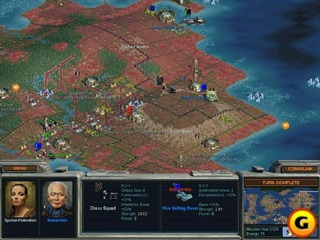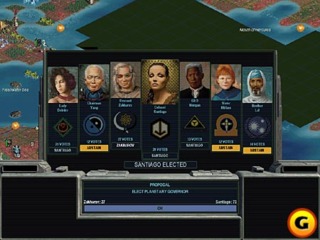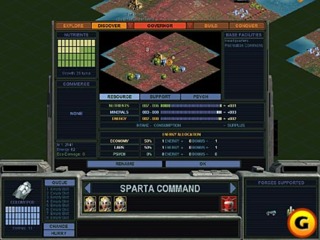Back in 1999, Greg Foertsch, Jerome Atherholt, and Mike Bazzell were all artists working on Sid Meier’s Alpha Centauri. Today, all three are still at Alpha Centauri developer Firaxis Games. Foertsch worked as the lead artist on XCOM: Enemy Unknown, while Atherholt and Bazzell are both working on the upcoming Beyond Earth. Together, they have an interesting perspective on how Firaxis’ latest project is different from both the Civilization series and fan-favorite Alpha Centauri. I caught up with this trio to learn more about these differences.
Do you consider Beyond Earth to be a spiritual successor to Alpha Centauri? Why?
It’s certainly great to be making another game about the future of humanity! We all have great memories of making the original Alpha Centauri here at Firaxis--it was one of the studio’s first projects, and it feels like such a long time ago because of how much has changed since those first days for us. Since we made Alpha Centauri, fans have always been asking us to remake that game, so we hope that they find the idea of a new game about settling on alien worlds and writing the next chapter for human history as exciting as we do.
When the audience makes the connection between Beyond Earth and Alpha Centauri there are going to be certain expectations about how this game will play. As developers, how do you reconcile the expectations of diehard Alpha Centauri fans with the needs of players new to the Civilization series?

We didn’t want to make a straight remake of that game. We want each entry in the Civilization series to be able to stand on its own, and we feel like Beyond Earth is going to live up to that legacy. We think a key part of what people remember about Alpha Centauri is the sense of taking humanity to the next level in its history, and we feel like this is something Beyond Earth does well.
Is there anything you personally couldn’t do in the original Alpha Centauri, for whatever reason, that you are now able to accomplish in Beyond Earth? How?
That’s hard to say! Certainly there are some big differences between the sprite-based graphics of Alpha Centauri and the fully 3D environments in Beyond Earth. We had a laugh among ourselves talking about some of the limitations we used to work under, graphically, because of the limitations of our hardware, versus what we can do today. But in terms of gameplay, it’s amazing what we were able to do even back then, and part of the beauty of strategy games is that so much of the game is carried through that.
On Alpha Centauri, [Mike Bazzell] created a couple of 2D sprite-sheet VFX explosions. Back then, there was only enough memory for two sprite sheets and we swapped 256-color palettes in order to use them for different weapons. On Beyond Earth, after concepting, Mike moved over to creating modern real-time particle VFX. There are astounding differences in technology across all aspects of game development between then--15 years ago--and now, but right there, the difference is amazing!
For Alpha Centauri, Jerome and Mike both did a lot of native life form creature concepts and Mike had everything to do with the creation of Sid Meier’s Alpha Centauri’s vehicular units. For Beyond Earth, the concepts that Mike created were for both alien creatures as well as some of the vehicles. What took that feeling of specialness a step further for Mike was the first time that he got to see the yellow worker vehicle concepted for Beyond Earth, in-game. It’s a nice connection that feels really great!
Alpha Centauri players enjoyed exploring the game’s different ideologies almost as much as its alien landscape. What process did the original team go through to design these ideologies? Will you be exploring similar themes in Beyond Earth, and in what way?

The ideologies in Alpha Centauri were really expressions of the different ways you could play the game--aggressive military style, or heavy on the science, or in tune with the planet. With Beyond Earth, you have the capability to tailor so much of your faction during the loadout phase by picking your colonists and your cargo and the information you can gather from orbit--essentially the new system is much more flexible. And on top of that, with the different affinities, you’ve got all sorts of combinations for directions in how to shape your culture--that we think you’ll see players being able to tell all sorts of stories about themselves and their opponents.
What were some of your sources of inspiration for Beyond Earth, either in terms of setting, tone, or how you wanted to the game to play?
The direction came from the designers and from Mike Bates, the lead artist on the game. They’re all focused on making sure that we’re working with an optimistic vision of the future since Civilization is a game about progressing through history and becoming stronger and better over time. As for the team leads, they took their inspiration from a wide range of science fiction, the history of spaceflight, and hard science. This lets us create a future that feels plausible and still creates a sense of wonder in players.
Alpha Centauri’s Planet presented a common threat for all players, and the quest to determine its ultimate fate gave the game a strong narrative hook. How does colonizing the alien world--or worlds--of Beyond Earth compare to Civilization’s terrestrial landscape?
It’s a very different-looking planet! The biomes are quite different from what you see on Earth. In addition, you’re landing on a planet that already has its own population of creatures that may or may not care for you to be there. Certainly the planet and its inhabitants play as much of a role as opponent as in Alpha Centauri.
How has the business of making video games changed over the past 15 years? What have we gained, and what has been lost?

So much has changed! The best part about a studio like Firaxis is that we have many, many people here who have been with the company from the early days, and even worked together back at MicroProse, so there’s this huge cultural memory for how video games have been developed in our area for decades. And now we have this new crop of developers who played the games we worked on, and we’re able to work with them as colleagues and start to transmit that knowledge to them as well. At the same time, we’re open to new ideas, and there are some things we’re able to do so much more easily than in 1996. They keep us on our toes and keep us learning new tools and tricks, and we’re able to show them some of the tricks that have worked for years.
As for what has been lost? Mostly our hair.